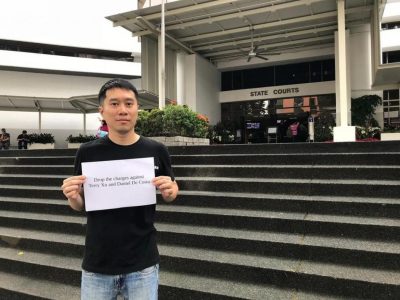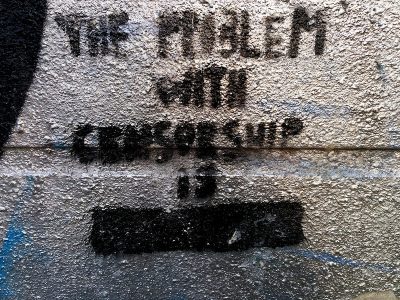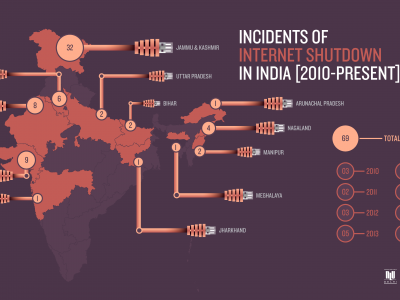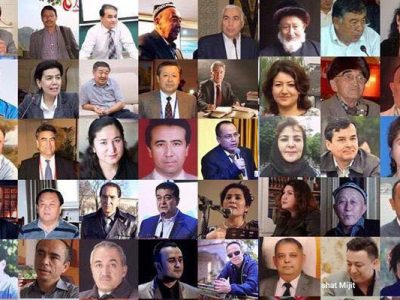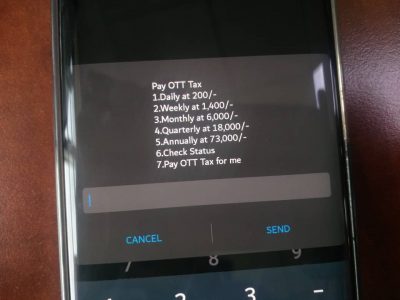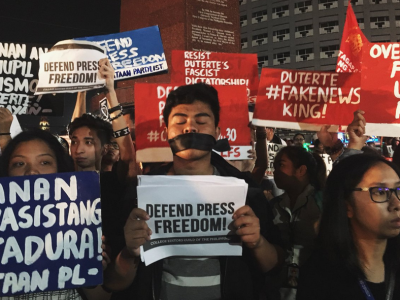Stories about Digital Activism from February, 2019
USCYBERCOM attack gives Russian legislators new justification for tighter internet controls
Both pro-Kremlin experts and their opponents see the USCYBERCOM's attack on the "troll factory" as ammunition for isolationist policies.
Mexican women protest for their lives as kidnappings and femicides surge
More than 150 people, most of them women, have been kidnapped from Mexico City's subway system over the past four years.
Journalists, teachers, and activists targeted in attacks on free speech in the Philippines
"These are attempts by those in power to drown out the voice of the marginalized...displaying Duterte’s fear of committed journalism that seeks to inform, educate and guide the public."
Singaporean activist sentenced to 16 days in jail after hosting video chat with HK youth leader Joshua Wong
"There’s no sentence that I’d consider fair, because he should never have been charged."
Facebook, robot vacuum cleaner and pro-surveillance politician voted worst privacy intruders in Czech Republic
The Big Brother “anti-awards” ceremony is designed to shame those who violate people's rights to privacy and data protection.
As Putin preaches ‘sovereignty’ and tech modernization, experts lament loss of online freedoms
As Vladimir Putin promises Russians a faster, more reliable internet, two reports by independent expert groups paint an unrelentingly bleak picture of more crackdowns on online freedom of speech.
Netizen Report: Both Bangladesh and South Korea are waging a ‘war on porn’ — and paving the way for political censorship
South Korea and Bangladesh are blocking porn and "obscene" content, Venezuela is blocking YouTube, and Uzbekistan has finally stopped blocking Facebook and VK.
Female Brazilian legislator attacked on social media for revealing outfit
"The participation of women in society is so tiny that a neckline can become a huge issue."
DigiGlot Newsletter: App links refugees with volunteer translators
The DigiGlot Newsletter is a bi-weekly collaborative newsletter that reports on how indigenous, minority, and endangered language communities are adopting and adapting technology to change the internet landscape.
EU proposal pushes tech companies to tackle ‘terrorist content’ with AI, despite implications for war crimes evidence
AI tools can assess whether a video is violent or graphic. But can they determine the video’s intended purpose?
Russian public sector workers ordered to ‘like’ social media posts promoting the 2019 Winter Universiade
This is not the first instance of Russian public officials acting as "human bots" to promote the government's agenda online.
Venezuelans see the politics of humanitarian aid play out in online attacks
A unique and technically sophisticated attack this week targeted VoluntariosxVenezuela, an opposition-aligned humanitarian aid website.
Netizen Report: Will India’s regional internet shutdowns ever end?
Internet shutdowns continue apace in India, Venezuela's opposition websites are under pressure and Uganda's social media tax is driving down internet use.
#MetooUyghur campaign asks Chinese government to prove that Xinjiang detainees are still alive
Uyghur communities from all over the world are using the #MetooUyghur hashtag to demand answers about the welfare of their loved ones.
Users flood Reddit with China censorship memes, balk at $150 million investment from Tencent
While Chinese companies regularly invest in US media companies, this makes for an unusual match.
Every vote counts? Tackling voter apathy and low voter turnout in Nigeria's national elections
Will every vote count in Nigeria's 2019 national elections? Voters are the missing link to a strong democracy. Understanding voter apathy is key to successful elections.
Bulgaria's parliament and an educational institute named top privacy violators in ‘Big Brother Awards’
The Bulgarian edition of the Big Brother Awards is back as a means of shaming the worst violators of citizens’ privacy.
Censored on WeChat: A year of content removals on China's most powerful social media platform
Our team tracked censored posts from more than 4,000 public accounts covering daily news on WeChat. Here is what we found.
Uganda's social media tax is leaving people disconnected — and failing to meet revenue targets
Prior to the tax's implementation, 47.4 percent of people in Uganda were using the internet. Three months later, that number had fallen to 35 percent.
Netizen Report: Philippine news outlet faces ‘cyber libel’ charges
Philippines DOJ takes another swing at Rappler news site, Facebook tackles disinformation in Indonesia and Russia moves to outlaw fake news.






